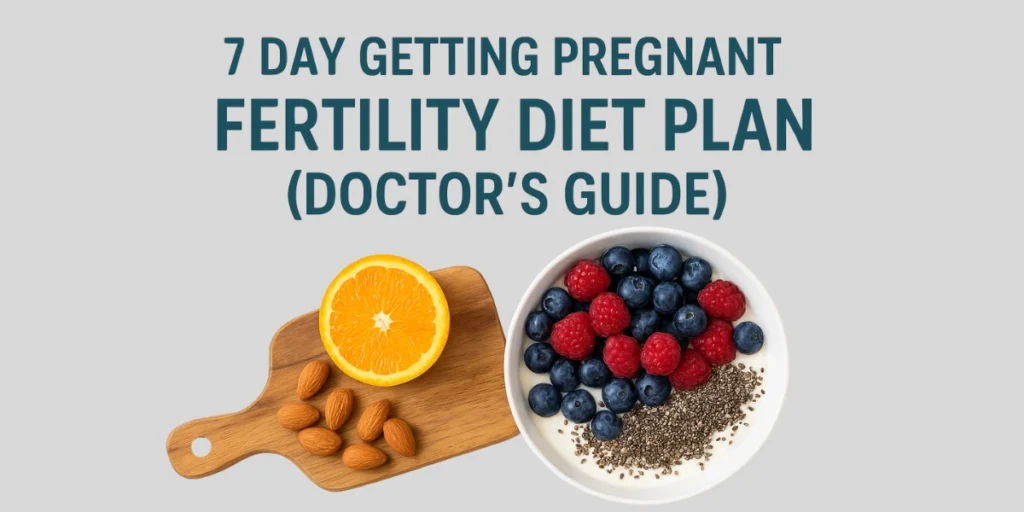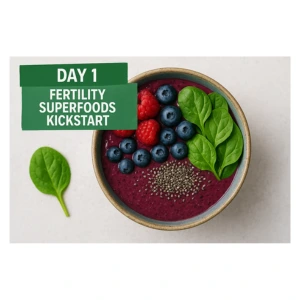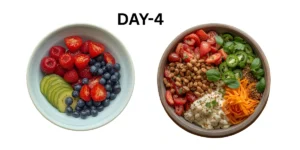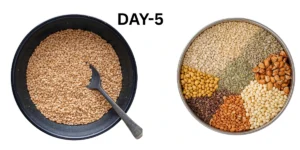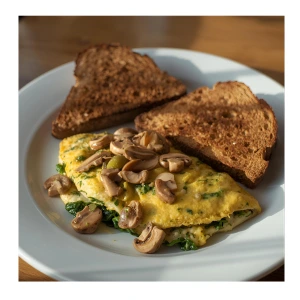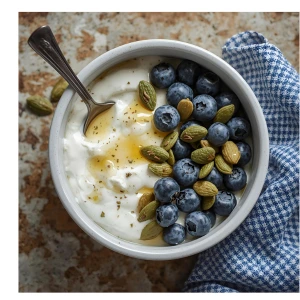7 Day Getting Pregnant Fertility Diet Plan (Doctor’s Guide)
Introduction
Struggling to conceive can be emotionally draining, but nutrition plays a crucial role in fertility for both men and women. Research shows that a balanced, nutrient-rich diet can regulate hormones, improve egg quality, enhance sperm health, and prepare the body for pregnancy.
In this article, I’ll walk you through a doctor-approved 7 Day Getting Pregnant Fertility Diet Plan with foods clinically shown to improve fertility. Alongside, we’ll explore key nutrients, lifestyle habits, and FAQs to help you and your partner maximize your chances of conception.
Day 1 Meal Plan – Kickstart Fertility with Antioxidants
Breakfast
- Women: Greek yogurt parfait with blueberries, raspberries, and chia seeds.
- Men: Spinach omelet with tomatoes, onions, and whole-grain toast.

Why this works:
- Berries are loaded with vitamin C and polyphenols that reduce oxidative stress.
- Yogurt provides probiotics, improving gut health and hormonal balance.
- Eggs and spinach deliver folate, vitamin D, and iron for healthy sperm and egg maturation.
Mid-Morning Snack
- A handful of almonds and an orange.
Nutritional Benefit:
- Almonds supply vitamin E, a key antioxidant for egg cell membrane protection.
- Oranges give vitamin C, which enhances sperm motility and reduces DNA fragmentation.
Lunch
- Women: Quinoa salad with avocado, chickpeas, olive oil, and kale.
- Men: Grilled chicken breast with brown rice and steamed broccoli.
Nutritional Benefit:
- Quinoa provides plant-based protein and magnesium, important for hormone regulation.
- Avocado adds monounsaturated fats, improving blood flow to reproductive organs.
- Olive oil offers anti-inflammatory compounds.
- Broccoli supports detoxification of excess estrogen, keeping hormones balanced.
Afternoon Snack
- Carrot sticks with hummus.
Nutritional Benefit:
- Carrots contain beta-carotene, a precursor to vitamin A, which supports sperm production and uterine lining health.
- Hummus provides plant-based protein and zinc, vital for sperm quality.
Dinner (Couples)
- Grilled salmon with roasted sweet potato and asparagus.
Nutritional Benefit:
- Salmon is rich in omega-3 fatty acids, which regulate hormones and improve uterine blood flow.
- Sweet potato is high in beta-carotene and vitamin B6, which support progesterone production.
- Asparagus provides folate, critical for DNA synthesis in sperm and egg cells.
Medical Reasoning – Why Antioxidants Matter
Antioxidants are the unsung heroes of fertility. Both male and female reproductive systems are highly sensitive to oxidative stress, which can result from poor diet, smoking, alcohol, obesity, or environmental toxins.
- For Women:
- Vitamin C helps prevent damage to ovarian follicles, supporting healthy ovulation.
- Vitamin E improves the quality of cervical mucus, helping sperm survive and swim.
- Selenium reduces the risk of miscarriage by protecting early-stage embryos.
- Folate, abundant in leafy greens, prevents neural tube defects and supports cell division.
- For Men:
- Zinc is crucial for testosterone production and sperm count.
- Vitamin C lowers sperm DNA fragmentation, increasing the chance of successful fertilization.
- Coenzyme Q10 (found in fish and nuts) boosts energy for sperm motility.
- Omega-3 fatty acids enhance sperm morphology (shape) and function.
By starting your fertility diet with antioxidants, you’re essentially protecting your reproductive cells from “rusting.” Just as antioxidants keep apples from browning when exposed to air, they keep your eggs and sperm younger, healthier, and more capable of creating new life.
Lifestyle Tips for Day
Nutrition is only one part of fertility. To get the best out of Day 1:
- Hydrate Well – Drink 2–3 liters of water. Proper hydration improves cervical mucus, making it easier for sperm to travel.
- Exercise Smart – Engage in 20–30 minutes of brisk walking or yoga. Avoid excessive high-intensity workouts that may disrupt ovulation in women or lower testosterone in men.
- Manage Stress – Stress hormones like cortisol can interfere with reproductive hormones. Try 10 minutes of deep breathing, journaling, or meditation.
- Limit Toxins – Reduce exposure to BPA from plastics and pesticides by choosing glass water bottles and washing fruits/vegetables thoroughly.
- Sleep Well – Aim for 7–8 hours of quality sleep to maintain optimal hormone regulation.
Lifestyle choices work synergistically with diet. Think of food as the foundation, and healthy habits as the walls and roof protecting your fertility home.
Day 2 Fertility Meal Plan
Breakfast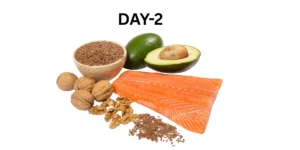
- Women: Overnight oats with flaxseeds, walnuts, almond milk, and strawberries.
- Men: Scrambled eggs with mushrooms, avocado slices, and whole-grain toast.
Why this works:
- Flaxseeds provide lignans (phytoestrogens) that balance estrogen levels.
- Walnuts support omega-3 intake, essential for hormone regulation.
- Avocado adds healthy monounsaturated fats for testosterone and progesterone synthesis.
Mid-Morning Snack
- Handful of pumpkin seeds with a banana.
Nutritional Benefit:
- Pumpkin seeds are rich in zinc and magnesium, both critical for sperm quality and luteal phase support in women.
- Bananas contain vitamin B6, which assists in progesterone production and mood regulation.
Lunch
- Women: Lentil and spinach curry with brown rice.
- Men: Grilled turkey breast with quinoa and sautéed kale.
Nutritional Benefit:
- Lentils provide plant-based protein and iron for ovulation.
- Spinach adds folate and magnesium to regulate cycles.
- Turkey contains lean protein and tryptophan, which supports serotonin and lowers stress.
Afternoon Snack
- Smoothie with kefir, blueberries, flax oil, and spinach.
Nutritional Benefit:
- Kefir offers probiotics, improving gut health, which is closely linked to estrogen metabolism.
- Flax oil enhances omega-3 intake for hormone balance.
Dinner (Couples)
- Grilled mackerel with roasted Brussels sprouts and wild rice.
Nutritional Benefit:
- Mackerel is high in vitamin D, essential for reproductive hormone regulation.
- Brussels sprouts contain compounds that help metabolize excess estrogen.
- Wild rice provides slow-release energy, preventing blood sugar spikes that disrupt hormones.
Medical Reasoning – Hormone Balance and Fertility
Hormones operate like a finely tuned symphony. When one instrument is out of tune, the entire melody suffers. Similarly, imbalance in reproductive hormones can disrupt ovulation, sperm production, and implantation.
- For Women:
- Estrogen and progesterone must alternate in harmony for regular cycles.
- High estrogen relative to progesterone (estrogen dominance) can lead to irregular bleeding and infertility.
- Low progesterone shortens the luteal phase, preventing proper implantation.
- PCOS is characterized by excess androgens, insulin resistance, and disrupted ovulation — all linked to diet and lifestyle.
- For Men:
- Testosterone drives sperm production, libido, and erectile function.
- Zinc deficiency lowers testosterone and reduces sperm count.
- Excessive alcohol, obesity, and stress elevate estrogen levels in men, impairing fertility.
Nutritional Fixes:
- Healthy fats (avocado, olive oil, nuts, fatty fish) support hormone synthesis.
- Complex carbs stabilize blood sugar, reducing insulin spikes that disrupt ovulation.
- Phytoestrogens (flaxseeds, soy, sesame seeds) help balance estrogen dominance.
- Vitamin D regulates ovarian function and sperm motility.
- Magnesium reduces PMS symptoms and supports testosterone production.
Research shows that couples who follow a hormone-supportive diet, such as the Mediterranean diet, have higher conception rates. A 2019 study in Human Reproduction found women adhering to this diet had a 40% higher chance of natural pregnancy compared to those with high processed food intake.
Balancing hormones naturally requires patience, but diet is a safe, effective, and science-backed strategy.
Lifestyle Tips for Day 2
In addition to diet, certain daily habits enhance hormone balance:
- Stress Management – Chronic stress raises cortisol, which suppresses reproductive hormones. Practice yoga, mindfulness, or deep breathing.
- Limit Caffeine and Alcohol – Excess caffeine disrupts adrenal hormones, while alcohol lowers testosterone.
- Maintain Healthy Weight – Even a 5–10% reduction in body weight can restore ovulation in women with PCOS.
- Get Morning Sunlight – Natural sunlight boosts vitamin D production, improving ovarian and testicular function.
- Sleep Routine – Aim for consistent bedtimes. Melatonin (produced during sleep) regulates reproductive hormones.
Day 3 – Boosting Egg & Sperm Quality with Protein & Iron
Breakfast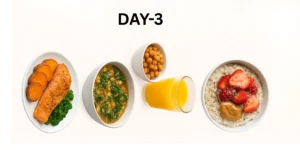
- Women: Iron-fortified oatmeal with strawberries, chia seeds, and almond butter.
- Men: Egg-and-spinach scramble with whole-grain bread.
Why this works:
- Fortified oats and spinach supply non-heme iron.
- Vitamin C from strawberries boosts absorption.
- Eggs add protein and choline, vital for sperm cell membranes.
Mid-Morning Snack
- Roasted chickpeas with a glass of orange juice.
Nutritional Benefit:
- Chickpeas provide plant-based protein and iron.
- Orange juice enhances iron absorption.
Lunch
- Women: Lentil soup with kale and lemon.
- Men: Grilled lean beef strips with quinoa and broccoli.
Nutritional Benefit:
- Lentils + kale = iron + folate for ovulation.
- Lean beef provides heme iron (highly absorbable) and zinc, boosting testosterone.
- Quinoa balances blood sugar and adds plant protein.
Afternoon Snack
- Greek yogurt with pumpkin seeds and blueberries.
Nutritional Benefit:
- Pumpkin seeds deliver zinc + iron.
- Yogurt provides protein and probiotics for gut and hormone health.
Dinner (Couples)
- Baked salmon with sweet potato and sautéed spinach.
Nutritional Benefit:
- Salmon supplies protein + omega-3 fatty acids for egg and sperm quality.
- Spinach enhances iron stores.
- Sweet potato provides beta-carotene, which supports luteal phase health.
Medical Reasoning – How Protein & Iron Enhance Fertility (≈400 words)
Iron’s Role in Female Fertility:
- Iron deficiency leads to poor oxygenation of ovarian follicles.
- Women with low ferritin (iron storage) have higher risk of anovulation.
- Adequate iron ensures proper endometrial development, making implantation more successful.
Iron’s Role in Male Fertility:
- Iron supports hemoglobin and oxygen supply to testicular tissue.
- Deficiency can impair energy metabolism in sperm, reducing motility.
Protein’s Role in Fertility:
- Amino acids from protein are used in hormone synthesis (estrogen, progesterone, testosterone).
- Egg development requires high levels of amino acids for follicular fluid.
- Sperm cells are protein-based, needing adequate dietary intake for DNA stability.
Research Evidence:
- A Harvard study (Obstetrics & Gynecology, 2006) found women who consumed plant-based iron had a 40% lower risk of infertility compared to those with low iron intake.
- A 2017 study in Andrology showed that men consuming high-protein, antioxidant-rich diets had better sperm morphology and count.
Key Synergy:
Iron works best with vitamin C (boosts absorption), while protein requires adequate vitamin B6 and zinc for metabolism — all included in today’s plan.
Lifestyle Tips
- Avoid Excess Tea/Coffee with Meals – Tannins in tea and caffeine can inhibit iron absorption. Keep caffeinated drinks at least 1 hour apart from iron-rich meals.
- Exercise Moderately – Light resistance training (15–20 minutes) improves blood circulation and boosts testosterone but avoid overtraining, which depletes iron.
- Hydrate Smartly – Add a slice of lemon to water for extra vitamin C.
- Cook in Cast Iron Pans – Cooking acidic foods (like tomato sauce) in cast iron increases dietary iron content.
- Pair Iron with Vitamin C – Always include citrus, bell peppers, or berries with iron meals.
Day 4 – Antioxidant-Rich Foods to Protect Egg and Sperm Health
- For Women

- Protects egg DNA from oxidative stress.
- Enhances endometrial health for better implantation.
- Supports hormonal balance, particularly estrogen and progesterone regulation.
- For Men
- Improves sperm motility and morphology.
- Prevents DNA fragmentation, improving chances of healthy fertilization.
- Boosts testosterone production.
Day 4 Meal Plan – Antioxidant Boost
Breakfast: Berry & Yogurt Bowl with Nuts
- Ingredients:
- 1 cup Greek yogurt (protein + probiotics)
- ½ cup blueberries & strawberries (vitamin C, polyphenols)
- 1 tbsp walnuts (omega-3 + vitamin E)
- 1 tsp chia seeds (fiber + antioxidants)
- Benefits:
- Berries fight oxidative stress, while yogurt supports gut health, crucial for hormonal regulation.
Mid-Morning Snack: Citrus Power Drink
- Ingredients:
- Fresh orange juice (vitamin C)
- ½ lemon squeezed in water
- A pinch of turmeric (anti-inflammatory)
- Benefits:
- Keeps you hydrated, boosts immunity, and enhances iron absorption.
Lunch: Spinach & Lentil Antioxidant Salad
- Ingredients:
- 1 cup cooked lentils (protein + folate)
- 1 cup baby spinach (beta-carotene + iron)
- ½ cup cherry tomatoes (lycopene for sperm health)
- Olive oil + lemon dressing (vitamin E + healthy fats)
- Benefits:
- A powerful mix of plant-based protein and antioxidants that protect both egg and sperm quality.
Afternoon Snack: Dark Chocolate & Green Tea
- Ingredients:
- 1 small piece of 70% dark chocolate (flavonoids)
- 1 cup green tea (catechins, powerful antioxidants)
- Benefits:
- Improves blood circulation to reproductive organs, enhances mood, and reduces stress.
Dinner: Grilled Salmon with Quinoa & Broccoli
- Ingredients:
- 1 salmon fillet (omega-3 + selenium)
- ½ cup quinoa (protein + fiber)
- 1 cup steamed broccoli (vitamin C + sulforaphane)
- Benefits:
- A fertility super-dinner: omega-3 improves ovulation, selenium boosts sperm count, and broccoli detoxifies estrogen.
Evening Drink: Pomegranate Smoothie
- Ingredients:
- 1 cup pomegranate seeds (polyphenols, antioxidants)
- ½ cup almond milk
- 1 tsp flax seeds
- Benefits:
- Pomegranate is shown in studies to improve sperm motility and support uterine blood flow.
Lifestyle Tips for Day 4
- Avoid Smoking & Excess Alcohol – they deplete antioxidants rapidly.
- Exercise Moderately – yoga and brisk walking reduce oxidative stress without overloading the body.
- Hydrate Well – water helps flush toxins that damage reproductive cells.
Scientific Evidence Behind Antioxidant Nutrition
- Vitamin C improves sperm motility and reduces DNA fragmentation (PubMed, 2016).
- Vitamin E protects egg membranes and boosts luteal phase support (Mayo Clinic).
- Polyphenols from green tea and pomegranate enhance endometrial receptivity (WHO Fertility Research Review).
By following Day 4 of the 7 day getting pregnant fertility diet plan, you actively shield your reproductive cells from oxidative stress while supporting hormonal and overall reproductive health.
Quick Recap: Day 4 Fertility Diet Plan
✅ Breakfast – Berry & Yogurt Bowl
✅ Snack – Citrus Drink
✅ Lunch – Spinach & Lentil Salad
✅ Snack – Dark Chocolate & Green Tea
✅ Dinner – Salmon with Quinoa & Broccoli
✅ Evening – Pomegranate Smoothie
Each meal is designed with antioxidants, omega-3s, and essential vitamins that increase the chances of conception.
Day 5 – Whole Grains & Hormone Balance for Fertility
- For Women

- Promotes regular ovulation cycles.
- Reduces risk of PCOS-related infertility.
- Supports a healthy luteal phase for implantation.
- For Men
- Balanced insulin levels protect testosterone production.
- Improves energy and libido.
- Reduces sperm DNA damage linked to hormonal imbalance.
📌 Focus Keyword: 7 day getting pregnant fertility diet plan
Day 5 Meal Plan – Whole Grains for Fertility
Breakfast: Warm Oatmeal with Seeds & Berries
- Ingredients:
- 1 cup rolled oats (B-vitamins, complex carbs)
- 1 tbsp pumpkin seeds (zinc for sperm health)
- 1 tbsp sunflower seeds (vitamin E for egg health)
- ½ cup mixed berries (antioxidants)
- Benefits:
- Oats keep blood sugar steady, while seeds regulate hormones and improve reproductive cell health.
Mid-Morning Snack: Whole-Grain Toast with Avocado
- Ingredients:
- 2 slices whole-grain bread
- ½ avocado (healthy fats for hormone production)
- A sprinkle of sesame seeds (calcium for egg health)
- Benefits:
- Avocados are rich in monounsaturated fats, vital for estrogen and progesterone balance.
Lunch: Quinoa & Grilled Chicken Salad
- Ingredients:
- 1 cup quinoa (fiber + protein)
- Grilled chicken breast (lean protein for muscle repair)
- Bell peppers, cucumbers, and arugula (vitamin C + folate)
- Olive oil + lemon dressing
- Benefits:
- Quinoa helps regulate insulin, while lean protein balances cortisol, indirectly supporting fertility hormones.
Afternoon Snack: Barley Soup with Vegetables
- Ingredients:
- 1 cup cooked barley
- Carrots, celery, and tomatoes
- Herbs and mild spices
- Benefits:
- Barley lowers insulin resistance and is linked to improved fertility outcomes in women with PCOS.
Dinner: Brown Rice with Tofu & Stir-Fried Vegetables
- Ingredients:
- 1 cup brown rice (fiber + magnesium)
- Tofu (plant-based protein + phytoestrogens in moderate amounts)
- Broccoli, mushrooms, and zucchini
- Benefits:
- Brown rice supports steady glucose release, while tofu provides plant estrogen-like compounds that help balance menstrual cycles.
Evening Drink: Golden Milk with Whole-Grain Crackers
- Ingredients:
- Warm milk with ½ tsp turmeric (anti-inflammatory)
- Whole-grain crackers (light, fiber-rich snack)
- Benefits:
- A soothing bedtime option that calms inflammation and supports hormonal balance.
Lifestyle Tips for Day 5
- Practice Stress Management – Stress disrupts cortisol, which interferes with estrogen, progesterone, and testosterone. Try deep breathing, meditation, or yoga.
- Avoid Refined Carbs – White bread, pastries, and sugary drinks spike insulin and disrupt hormones.
- Ensure Adequate Sleep – 7–9 hours nightly helps regulate reproductive hormones like FSH, LH, and melatonin.
Scientific Evidence
- Women with higher whole-grain intake have improved ovulatory function and lower infertility risk (Harvard School of Public Health, Fertility & Sterility Journal, 2018).
- Whole grains reduce insulin resistance, a common fertility barrier in PCOS (PubMed, 2020).
- Magnesium from brown rice and oats supports luteal phase progesterone production.
By focusing on whole grains and hormone-balancing foods, Day 5 of your 7 day getting pregnant fertility diet plan helps align your metabolism and reproductive system for optimal conception.
Quick Recap: Day 5 Fertility Diet Plan
✅ Breakfast – Oatmeal with seeds & berries
✅ Snack – Whole-grain toast with avocado
✅ Lunch – Quinoa & grilled chicken salad
✅ Snack – Barley soup
✅ Dinner – Brown rice with tofu & veggies
✅ Evening – Golden milk + whole-grain crackers
Each meal supports stable blood sugar, hormone balance, and fertility-friendly nutrition.
Day 6 – Iron-Rich & Oxygen-Boosting Foods for Fertility
- For Women
- Supports ovulation by aiding hemoglobin production.
- Prevents anemia, a condition linked to irregular cycles.
- Ensures a nutrient-rich uterine lining for implantation.
- For Men
- Enhances oxygen flow to reproductive organs.
- Improves sperm motility and energy production.
- Reduces fatigue that impacts libido and sexual function.
Day 6 Meal Plan – Iron & Oxygen Support
Breakfast: Spinach & Mushroom Omelet with Whole-Grain Toast
- Ingredients:

- 2 eggs (protein + vitamin B12)
- 1 cup spinach (non-heme iron)
- ½ cup mushrooms (selenium + antioxidants)
- Whole-grain toast
- Benefits:
- Eggs supply B-vitamins, while spinach delivers iron. Vitamin C from mushrooms improves absorption.
Mid-Morning Snack: Fresh Orange & Almonds
- Ingredients:
- 1 medium orange (vitamin C for iron absorption)
- 10 almonds (healthy fats + magnesium)
- Benefits:
- Vitamin C-rich fruits help absorb plant-based iron efficiently.
Lunch: Lentil & Beetroot Salad with Olive Oil Dressing
- Ingredients:
- 1 cup cooked lentils (iron + folate)
- 1 medium beetroot (iron + nitric oxide booster)
- Cucumbers, bell peppers, fresh herbs
- Olive oil + lemon juice dressing
- Benefits:
- Lentils and beets are iron-rich, while lemon juice provides vitamin C to maximize uptake.
Afternoon Snack: Apple with Peanut Butter
- Ingredients:
- 1 medium apple (antioxidants + fiber)
- 2 tbsp peanut butter (iron + protein)
- Benefits:
- A balanced snack combining iron, protein, and fiber to keep energy steady.
Dinner: Grilled Salmon with Steamed Broccoli & Quinoa
- Ingredients:
- 1 salmon fillet (heme iron + omega-3s)
- 1 cup broccoli (vitamin C for iron absorption)
- 1 cup quinoa (iron + complete protein)
- Benefits:
- Salmon boosts oxygen delivery and improves egg quality, while quinoa provides plant-based iron.
Evening Drink: Beetroot-Carrot Juice
- Ingredients:
- 1 medium beetroot
- 2 carrots
- ½ lemon
- Benefits:
- A natural iron booster drink that improves blood oxygenation and circulation.
Lifestyle Tips for Day 6
- Pair Iron with Vitamin C – Always combine plant-based iron with a vitamin C source for maximum absorption.
- Limit Tea & Coffee Around Meals – Tannins inhibit iron absorption, so avoid drinking them near iron-rich meals.
- Exercise Moderately – Walking, yoga, or cycling improves blood flow and oxygen delivery to reproductive organs.
Scientific Evidence
- Women with higher heme and non-heme iron intake are at lower risk of ovulatory infertility (Harvard Nurses’ Health Study, Fertility & Sterility, 2006).
- Beetroots enhance nitric oxide, improving blood circulation to the uterus and ovaries, aiding implantation (PubMed, 2015).
- Iron supplementation before conception reduces risk of anemia in pregnancy (WHO guidelines).
By focusing on iron-rich and oxygen-boosting foods, Day 6 of your 7 day getting pregnant fertility diet plan improves energy, supports ovulation, and enhances sperm health—boosting overall fertility outcomes.
Quick Recap: Day 6 Fertility Diet Plan
✅ Breakfast – Spinach & mushroom omelet + whole-grain toast
✅ Snack – Orange + almonds
✅ Lunch – Lentil & beetroot salad
✅ Snack – Apple + peanut butter
✅ Dinner – Salmon + broccoli + quinoa
✅ Evening – Beetroot-carrot juice
This approach ensures better oxygen supply, stable energy, and iron sufficiency for both partners.
Day 7 – Zinc & Antioxidant-Rich Fertility Foods
- For Women
- Supports proper egg maturation and ovulation.
- Regulates hormones like progesterone and estrogen.
- Protects egg cells from free radical damage.
- For Men
- Improves testosterone levels and sperm count.
- Enhances sperm motility and morphology.
- Protects sperm DNA from oxidative stress.
- Scientific Evidence
- Zinc deficiency is linked with delayed ovulation and poor egg quality (American Journal of Clinical Nutrition).
- Antioxidants such as vitamin E, vitamin C, selenium, and CoQ10 are shown to improve sperm parameters and female egg health (PubMed, 2019).
Day 7 Meal Plan – Zinc & Antioxidant Boost
Breakfast: Greek Yogurt with Blueberries, Pumpkin Seeds & Honey
- Ingredients:

- 1 cup plain Greek yogurt (zinc + probiotics)
- ½ cup blueberries (antioxidants)
- 2 tbsp pumpkin seeds (zinc powerhouse)
- 1 tsp raw honey
- Benefits:
- Probiotics improve gut health, zinc boosts ovulation and sperm health, and blueberries protect against oxidative stress.
Mid-Morning Snack: Green Smoothie with Kiwi & Spinach
- Ingredients:
- 1 kiwi (vitamin C + antioxidants)
- 1 handful spinach (folate + antioxidants)
- 1 banana (potassium)
- ½ cup almond milk
- Benefits:
- Rich in antioxidants and folate, supporting egg development and uterine health.
Lunch: Grilled Chicken with Quinoa & Steamed Asparagus
- Ingredients:
- 1 grilled chicken breast (zinc + lean protein)
- 1 cup quinoa (zinc + complete protein)
- 1 cup steamed asparagus (antioxidants + vitamin E)
- Benefits:
- Chicken and quinoa supply zinc for fertility hormones, while asparagus protects reproductive cells.
Afternoon Snack: Walnuts & Dark Chocolate (70% Cocoa)
- Ingredients:
- 5–6 walnuts (omega-3 + zinc)
- 2 small squares dark chocolate (antioxidants)
- Benefits:
- A perfect fertility snack: walnuts improve sperm motility, and dark chocolate reduces oxidative stress.
Dinner: Oysters or Salmon with Sweet Potato & Kale Salad
- Ingredients:
- 6 oysters (one of the richest sources of zinc) or 1 salmon fillet
- 1 medium baked sweet potato (beta-carotene + antioxidants)
- 1 cup kale salad with olive oil (antioxidants + omega-3s)
- Benefits:
- Oysters provide the highest zinc concentration for fertility, while sweet potatoes and kale offer antioxidant protection for egg and sperm quality.
Evening Drink: Pomegranate Juice
- Ingredients:
- 1 cup fresh pomegranate juice
- Benefits:
- Known as a fertility superfruit, pomegranate enhances uterine blood flow and improves sperm count.
Lifestyle Tips for Day 7
- Stay Hydrated – Water supports nutrient transport and cervical mucus quality.
- Limit Alcohol & Smoking – Both increase oxidative stress, reducing fertility.
- Include Daily Relaxation – Meditation, yoga, or even deep breathing reduces cortisol (stress hormone) that interferes with fertility.
Putting It All Together – Day 7 Recap
✅ Breakfast – Greek yogurt + blueberries + pumpkin seeds + honey
✅ Snack – Green smoothie (kiwi, spinach, banana, almond milk)
✅ Lunch – Grilled chicken + quinoa + asparagus
✅ Snack – Walnuts + dark chocolate
✅ Dinner – Oysters/salmon + sweet potato + kale salad
✅ Evening – Pomegranate juice
The Complete 7 Day Getting Pregnant Fertility Diet Plan
Now that you’ve followed through all 7 days, here’s a quick overview:
- Day 1 – Folate & Vitamin B-rich foods
- Day 2 – Omega-3 & Protein for reproductive health
- Day 3 – Antioxidant-rich fruits & vegetables
- Day 4 – Hormone-balancing healthy fats
- Day 5 – Dairy & calcium for ovulation support
- Day 6 – Iron-rich and oxygen-boosting foods
- Day 7 – Zinc & antioxidant-rich fertility foods
Conclusion
By completing the 7 day getting pregnant fertility diet plan, couples can naturally improve their chances of conception. Each day builds on critical nutrients — folate, omega-3, iron, zinc, antioxidants, and calcium — that strengthen egg quality, sperm health, hormonal balance, and implantation readiness.
💡 This diet plan is not a replacement for medical treatment but a supportive strategy. Couples facing ongoing infertility should consult a fertility specialist for further evaluation.
FAQs
Q1: What is the 7 day getting pregnant fertility diet plan?
The 7 day getting pregnant fertility diet plan is a structured weekly meal guide designed to improve reproductive health in both men and women. It focuses on fertility-boosting nutrients such as folate, omega-3 fatty acids, zinc, iron, and antioxidants that support egg quality, sperm health, and hormone balance.
Q2: Can this diet plan help me conceive faster?
Yes, while no diet guarantees pregnancy, the 7 day getting pregnant fertility diet plan provides the body with essential nutrients shown in research to improve fertility outcomes. By reducing oxidative stress, regulating hormones, and enhancing sperm and egg quality, this plan may significantly boost your chances of conception.
Q3: Is the 7 day getting pregnant fertility diet plan only for women?
No. The 7 day getting pregnant fertility diet plan is created for couples. Women benefit from improved ovulation, egg health, and uterine lining support, while men benefit from enhanced sperm motility, count, and testosterone balance.
Q4: What foods are included in the 7 day getting pregnant fertility diet plan?
The 7 day getting pregnant fertility diet plan includes:
- Whole grains (brown rice, oats, quinoa)
- Lean proteins (chicken, turkey, lentils, fish)
- Healthy fats (avocado, olive oil, walnuts)
- Antioxidant-rich fruits & vegetables (berries, spinach, kale, pomegranate)
- Fertility superfoods (pumpkin seeds, oysters, salmon, sweet potatoes)
Q5: Can the 7 day getting pregnant fertility diet plan help with PCOS?
Yes. Many women with PCOS benefit from this approach because the 7 day getting pregnant fertility diet plan emphasizes whole grains, low glycemic foods, and hormone-balancing nutrients. These choices help regulate insulin resistance and promote regular ovulation.
Q6: Do men also need to follow the 7 day getting pregnant fertility diet plan?
Absolutely. Male fertility contributes to 50% of conception success. The 7 day getting pregnant fertility diet plan improves sperm count, motility, and DNA integrity by including zinc, vitamin C, selenium, and omega-3 fatty acids.
Q7: How soon can results be seen with this diet plan?
Fertility nutrition works gradually. Following the 7 day getting pregnant fertility diet plan consistently for 2–3 months may show noticeable improvements in energy, menstrual regularity, sperm quality, and overall reproductive health.
Q8: Can I repeat the 7 day getting pregnant fertility diet plan for longer than a week?
Yes, the 7 day getting pregnant fertility diet plan is designed to be sustainable. You can cycle through it multiple weeks or months, making small variations to keep meals interesting while maintaining nutrient balance.
References
- Harvard T.H. Chan School of Public Health – Nutrition and Fertility
https://www.hsph.harvard.edu/nutritionsource/fertility/ - National Institutes of Health (NIH) – Dietary Supplements and Reproductive Health
https://ods.od.nih.gov/ - American Society for Reproductive Medicine (ASRM) – Nutrition and Fertility Guidelines
https://www.asrm.org/ - Journal of Human Reproduction – Mediterranean Diet, Antioxidants & Conception Rates
https://academic.oup.com/humrep - Mayo Clinic – Fertility Nutrition and Lifestyle Factors
https://www.mayoclinic.org/ - PubMed – Antioxidants, Omega-3 Fatty Acids, and Male/Female Fertility
https://pubmed.ncbi.nlm.nih.gov/ - World Health Organization (WHO) – Preconception Nutrition Guidelines
https://www.who.int/health-topics/preconception-care - Fertility and Sterility Journal – Iron, Zinc, and Micronutrient Impact on Fertility
https://www.fertstert.org/ - American Journal of Clinical Nutrition – Zinc, Vitamin C, and Antioxidant Role in Conception
https://academic.oup.com/ajcn - Johns Hopkins Medicine – Male Fertility, Sperm Health & Lifestyle Interventions
https://www.hopkinsmedicine.org/ - Cleveland Clinic – PCOS, Insulin Resistance, and Fertility-Friendly Diets
https://my.clevelandclinic.org/ - National Health Service (NHS UK) – Preconception Nutrition and Healthy Diet Tips
https://www.nhs.uk/ - Kinsey Institute – Research on Male/Female Reproductive Health and Lifestyle Factors
https://kinseyinstitute.org/ - World Health Organization – Micronutrients for Women’s Reproductive Health
https://www.who.int/publications/i/item/micronutrients-for-women - PubMed Central – Coenzyme Q10, Selenium, and Fertility Enhancement
https://www.ncbi.nlm.nih.gov/pmc/
.

